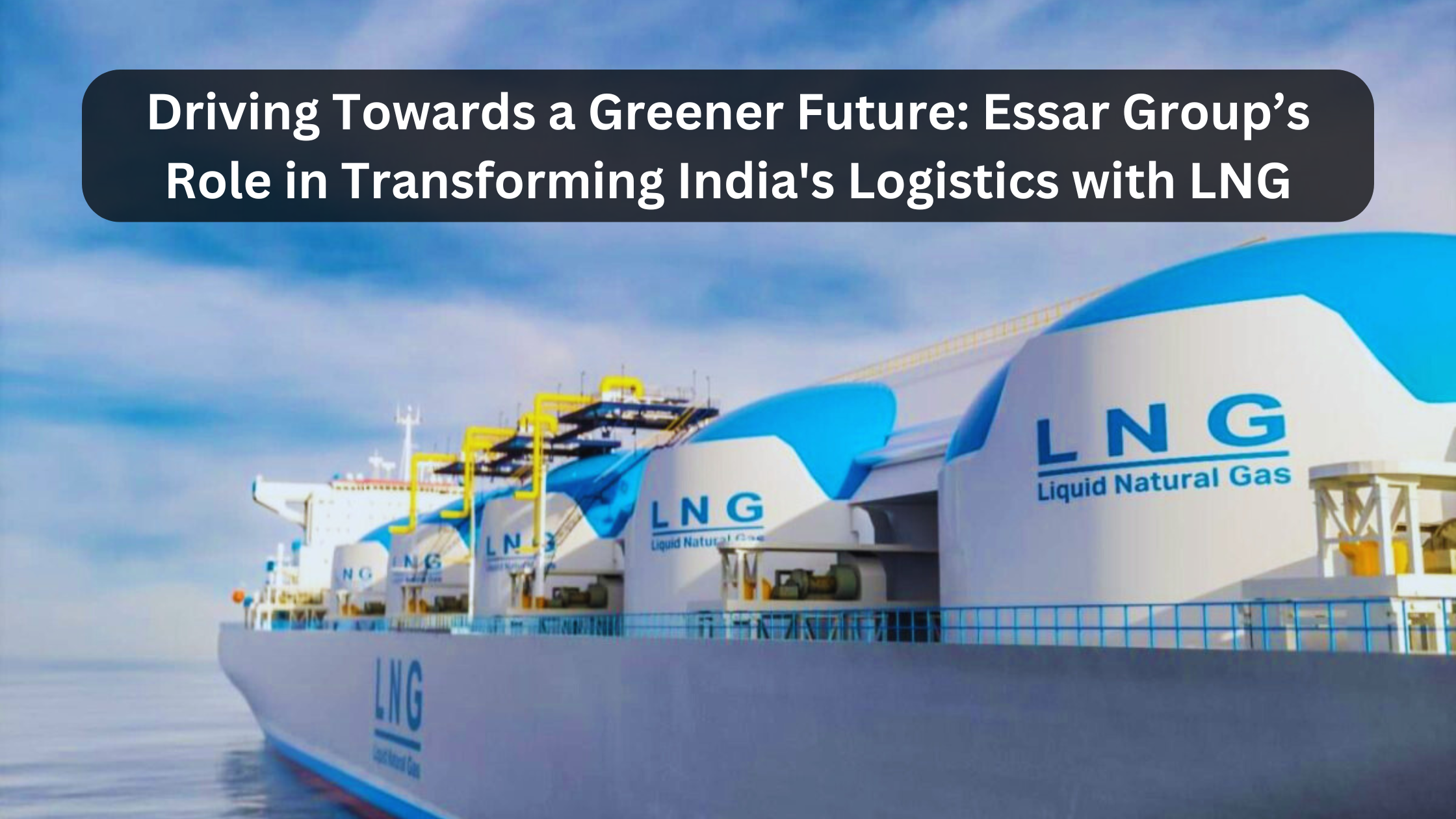
As the global landscape continues to evolve, the importance of resilient and sustainable logistics systems has come to the forefront. In an era where economic growth must go hand in hand with environmental conservation, the adoption of sustainable practices has never been more critical.
In this context, Liquefied Natural Gas (LNG) has emerged as a key player in transitioning to cleaner energy sources, particularly in the transportation sector. As countries like India work towards reducing their carbon footprints and achieving ambitious sustainability goals, the deployment of LNG-powered vehicles becomes increasingly vital. The global trend indicates a rising demand for LNG, with projections estimating the market for LNG trucks to grow from USD 1.82 billion in 2022 to USD 3.59 billion by 2029.
In India, the Essar Group, under the visionary leadership of Prashant Ruia Essar, is at the forefront of promoting sustainable logistics and advancing the use of LNG in transportation. With an increasing focus on sustainability and energy security, Essar’s initiatives are set to make a significant impact on both economic growth and environmental health.
The Importance of LNG in Green Logistics
As India evolves from an emerging market into a fully developed superpower, it aims to achieve the net-zero mark by 2070, a significant step to sustainability. Along various sectors, the road transport sector is also a key contributor to carbon emissions; accounting for a staggering 90% of the overall emissions in transportation, primarily due to the extensive use of diesel-powered trucks. Thus, transitioning to cleaner alternative fuels is both imperative and urgent.
While electric vehicles (EVs) are gaining traction in two-wheelers and passenger cars, the challenges faced by last-mile freight transport and long-haul logistics necessitate a proven alternative already available in the market: Liquefied Natural Gas (LNG).
LNG is the cleanest burning fuel, offering a compelling solution by burning significantly cleaner than diesel, presenting a remarkable reduction in emissions from heavy trucking. Trucks powered by LNG emit up to 28% less carbon dioxide, 70% less carbon monoxide, and 59% less nitrogen oxide than their diesel counterparts.
Adopting LNG in long-haul trucking not only addresses environmental concerns but also presents economic opportunities, aligning with the country’s commitment to reduce operating costs and improve air quality.
Essar’s Green Mobility Eco-system
The multinational company Essar Group, with operations in Energy, Infrastructure, Metals & Mining, and Technology& Retail, recognises the significance of sustainable logistics for the country’s economic growth and environmental well-being. The synergy between Environmental, Social, and Governance (ESG) principles and operational practices has gained wider popularity, prompting a dynamic shift in the industry landscape. One of the most sustainable solutions to reduce carbon emissions is adoption of Liquefied Natural Gas (LNG) trucks within the logistics sector.
In line with this, GreenLine Mobility Solutions Ltd., a key player in Essar’s Green Mobility initiative, has partnered with numerous renowned companies including Sterlite Copper (a unit of Vedanta Ltd.) Hindalco Birla Copper, Nestle India, Dalmia Cement, JSW Cement, etc. to introduce LNG-powered trucks as a significant milestone in reducing their carbon footprints and promoting cleaner logistics practices within the industrial sector. These partnerships aim to streamline transport for the brand’s goods through LPG trucks.
Switching to GreenLine’s fleet of LNG-powered trucks allows industries to decarbonise their heavy trucking, reduce toxic emissions, improve their ESG performance, and reap economic benefits. Currently operating over 500 trucks, GreenLine will deploy additional,1000 LNG-powered trucks in the fiscal year ending March 2025 (FY25), marking a significant expansion in its capabilities- CEO Anand Mimani stated in an interview. According to Prashant Ruia, Director, Essar Capital,
Essar’s commitment toward sustainability goes beyond the adoption of LNG-powered vehicles. The company has taken numerous initiatives towards adopting sustainable technologies to reduce the environmental impact of logistics operations. These initiatives include investments in electric vehicles for short-haul transportation, a green hydrogen plant in Gujarat, green steel plant in Saudi Arabia. the world’s first decarbonised green refinery in the UK, etc.
Growing Demand for Sustainable Logistics in India
Although India and several other nations still rely on the traditional logistics ecosystem, the impacts of the same on cost and environment are not favourable. Conventional logistics pose a significant threat to greenhouse gas emissions, a primary driver of global climate change.
India currently ranks third among the countries with the highest CO2 emissions, with a recorded emission level of approximately 2,500 megatonnes. Moreover, the country’s air pollution levels, around 53 µg/m³, has become a pressing concern.
The leading cause of such emissions is the increasing reliance on petrol and dieselpowered vehicles for transportation. While renewable energy sources such as biofuels, renewable energy, and electric vehicles are gaining momentum globally, countries like India still depend heavily on petroleum for transportation. The government faces the challenge of developing the infrastructure necessary for managing sustainable logistics. This is where companies like Essar Group play a vital role in promoting green logistics solutions.
Significance of Sustainability in Logistics and Transport?
Sustainability in logistics and transport plays a crucial role in both environmental conservation and economic viability.
Reducing Carbon Footprint- The main agenda of sustainable logistics is to minimise the carbon footprint of transport operations by using alternative vehicle technologies instead of petrol and diesel and optimizing fuel consumption through efficient transport routes. By focusing on eco-friendly solutions, logistic industries can lower greenhouse gas emissions from traditional diesel trucks and fossil fuels.
Long-Term Cost Savings- Green logistics strategies lower the overall energy usage and fuel costs. Moreover, businesses prioritizing sustainability can reduce expenses related to raw materials and last-mile delivery emissions. These practices, when deployed effectively, can reduce the ecological footprint and prove beneficial in the long run.
The Way Forward
Essar’s Green Mobility Solutions represents a transformative shift in India’s road logistics, steering the nation towards a sustainable and environmentally responsible future. By addressing the complexities of LNG adoption in the transportation sector, the group contributes to India’s ambitious climate goals. This initiative sets a benchmark for corporate responsibility and innovation in green mobility.
With the world moving towards sustainability, the group’s commitment stands as a testament to guiding the nation and inspiring global stakeholders to embrace cleaner, greener transportation solutions. By reducing emissions, Essar not only fosters a healthier environment but also positions itself as responsible entity in the global market. LNG acts as a bridge fuel, providing an immediate solution while electric vehicle infrastructure is still being developed.







